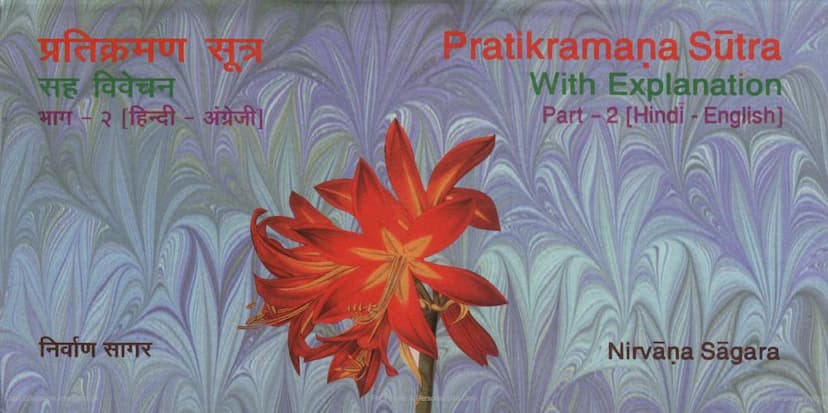Pratikramana Sutra Part 2
Added to library: September 2, 2025
Loading image...

Summary
This Jain text, "Pratikramana Sutra Part 2" by Nirvansagar, published by Arunoday Foundation, is a comprehensive guide to the Jain practice of Pratikramana, presented in both Hindi and English. The book aims to make these essential religious rites accessible to a wider audience, particularly those familiar with the English script.
Key aspects covered in the book include:
- Explanation of Pratikramana: The text defines Pratikramana as a process of "returning back," contrasting it with "ākramaṇa" (attack or going out). It emphasizes Pratikramana as a crucial "avaśyaka kriyā" (necessary rite) for the soul, as essential as breathing is for the body.
- The Six Avaśyakas: The book provides a brief overview of the six essential Jain practices that fall under the category of Avaśyaka Kriyā:
- Sāmāyika (Samayika): The practice of equanimity and spiritual upliftment.
- Caturvinśati-stava (Twenty-four Tirthankara Praises): Eulogizing the virtues of the twenty-four Tirthankaras, seen as supreme individuals who have achieved passionlessness.
- Vandana (Obeisance): A symbol of humility, essential for gaining knowledge by removing the ego.
- Pratikramana (Confession and Return): A rite of confessing offenses and sins committed by the soul and returning to one's self-imposed restrictions. It details the four types of offenses: atikrama, vyatikrama, aticāra, and anācāra.
- Kāyotsarga (Abandonment of the Body): Letting go of attachment to the body to facilitate self-contemplation.
- Pratyākhyāna (Abandonment and Acceptance): Renouncing things harmful to the soul and accepting beneficial ones, seen as a medicine for achieving spiritual freedom.
- Detailed Introduction to Pratikramana Sutras: The book dedicates a significant portion to explaining the significance and purpose of Pratikramana, highlighting its role in purifying the soul and achieving spiritual progress.
- Transliteration and Pronunciation Guidance: A substantial section is dedicated to explaining the transliteration system used, acknowledging the limitations of the English alphabet and providing diacritic marks for accurate pronunciation of Sanskrit and Prakrit words. It emphasizes the importance of correct pronunciation in Jain scriptures for retaining the intended meaning. Charts for English and Indian pronunciation of Nagari script letters are included.
- Detailed Explanation of Sutras: The book systematically presents various sutras related to Pratikramana, including those for:
- Devāsiya Pratikramana: For misdeeds committed during the day.
- Rāiya Pratikramana: For misdeeds committed during the night.
- Panchācāra ke Aticāra: Offenses related to the five conducts (Jnana, Darsana, Caritra, Tapa, Virya).
- Sūguru Vandana: Obeisance to the Guru.
- Sāta Lākha (Seven Lakhs): Mentioning various categories of living beings (earth-bodied, water-bodied, etc.) to confess harm caused.
- Aṭhārahā Pāpasthāna (Eighteen Places of Sin): Listing and confessing the eighteen primary sins.
- Savvassa Vi Sūtra: A general confession of daily misdeeds.
- Icchāmi Padikkamiu?: A sutra for general confession and seeking forgiveness.
- Vandittu Sūtra: A comprehensive sutra for confessing various offenses related to vows, conducts, and spiritual practices.
- Abhūṭṭhio mi Sutra: Seeking forgiveness for discourtesies shown towards the Guru.
- Āyariya-uvajjhāe Sūtra: Seeking forgiveness towards the Guru, co-religionists, and all living beings.
- Various Stutis (Eulogies): Including praises for Śruta-devatā (Goddess of Scriptures), regional deities, deities associated with temples, and various Tirthankaras.
- Kāvya Vibhāg (Poetic Sections): This section includes various devotional poems and couplets, such as:
- Names and Colors of Tirthankaras and Navapada: Providing a list for remembrance and veneration.
- Couplets for Pradakshina (Circumambulation): For use during circumambulatory rituals.
- Couplets for Prabhu Darśana (Viewing the Lord): Prayers and expressions of devotion during idol worship.
- Various Puja Couplets: For offering water, sandalwood, flowers, incense, lamps, camphor, fruits, and grains.
- Caityavandana and Stavana: Hymns and praises for various Tirthankaras (e.g., Simandhara Swami, Rishabha Swami, Parshvanatha Swami, Shantinatha Swami) and pilgrimage sites (e.g., Siddhachala).
- Sajjhāya: Devotional songs and reflections on spiritual themes, including stories of great souls like Manoramā Sati, Prasannachandra Rājārṣi, and the significance of auspicious days like Ashtami and Ekadashi.
- Vidhi Vibhāg (Procedures): This section details the practical steps and specific recitations for performing various rituals like taking and completing Sāmāyika, Guru Vandana, Caitya Vandana, and different types of Pratikramana (Devāsiya and Rāiya). It also includes the specific mantras and phrases (bol) used during the Muhapatti Padilehana (cleaning of the mouth cloth).
- Namaskāra Mahā Mantra: The book also includes a hymn dedicated to the Navkar Mantra, highlighting its significance and power.
- Acknowledgement of Contributors: The publication acknowledges the support of various individuals and families who contributed financially and in other ways to its production.
- Guidance from Acharyas: The book is presented with the blessings and guidance of esteemed Jain Acharyas, emphasizing the importance of learning from a guru.
In essence, "Pratikramana Sutra Part 2" is a valuable resource for Jains seeking to understand and practice the essential ritual of Pratikramana, enriched with detailed explanations, practical procedures, and devotional poetry, making it a comprehensive spiritual guide.